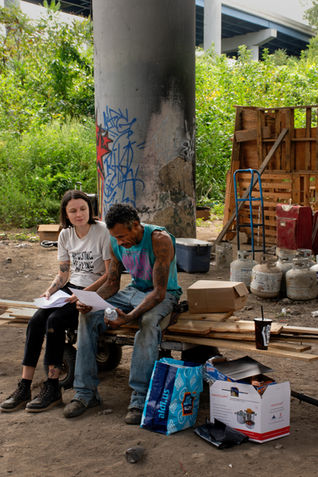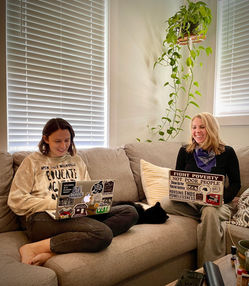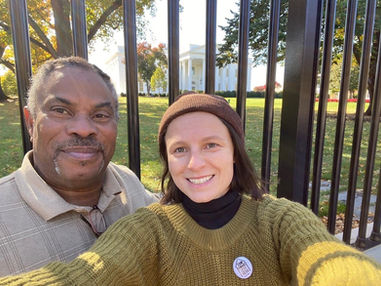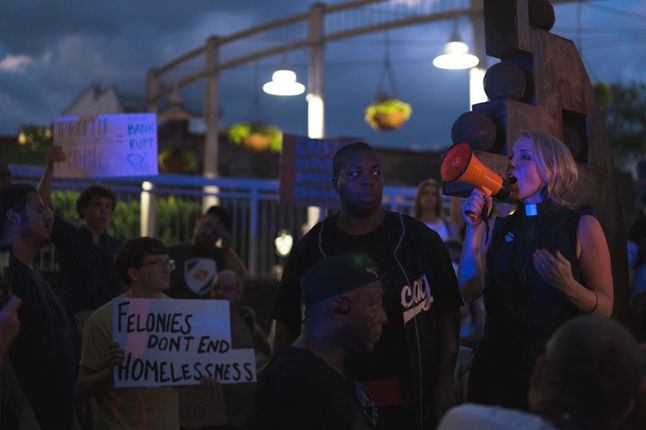Advocacy
In order to disrupt cycles of poverty and homelessness, Open Table Nashville believes we must fight unjust policies and work toward systemic change.
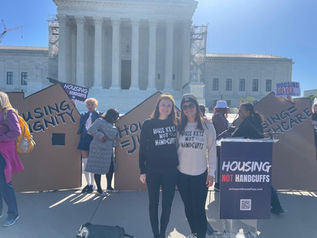
Our ultimate goal is not only to end homelessness, but also to create a society in which everyone can thrive. While we focus on making affordable, accessible housing a reality for all, we also recognize that issues of housing justice are deeply interconnected with racial justice, economic justice, food justice, workers’ rights, immigrant and refugee rights, LGBTQIA+ rights, reproductive justice, transportation justice, environmental justice, disability justice, education, living wages, and other issues.
We work with local, regional, and national partners towards systemic change because we believe that another world is possible.

Open Table Nashville is one of the founding organizations of Housing For All Tennessee, a coalition of on-the-ground organizations and partners focused on affordable housing, tenants' rights, and ending homelessness in Tennessee. The coalition works towards systemic transformation by developing and advancing a statewide policy platform while coordinating and strengthening our local campaigns.
Advocacy Focus Areas
01
Housing for All
Open Table Nashville believes housing is a human right. Every day, we bear witness to the inhumane conditions our friends are subjected to without housing. We know that providing safe, dignified, and accessible housing is the only solution to ending homelessness, but federal funding for affordable housing has been slashed since the 1980s. We advocate for Housing First, an evidence-based practice that supports the idea that housing should be available, safe, affordable, and dignified, regardless of criminal background, drug use, and other barriers.
Some of the work we actively support includes:
Securing affordable housing for all
We believe that everyone should have access to affordable, accessible, and dignified housing.
Pushing for dedicated sources of funding
We support housing trust funds like the Barnes Fund that leverage public funding for affordable housing. In 2019, we protested Mayor Cooper’s decision to slash Barnes Funding in half. In 2021, we asked Metro Council to allocate millions of dollars of American Rescue Plan funds to the Barnes Fund.
Creating housing cooperatives
We believe that housing should not be a commodity, which is why we support alternative housing models such as housing cooperatives that are collectively owned by the tenants instead of a landlord.
Protecting tenants' rights
We believe that tenants should be at the forefront of decisions regarding their housing and that their rights should be respected and expanded. Most recently, we worked with partner organizations to support Riverchase residents when their complex was sold to a developer.
02
Homelessness is Not a Crime
While we know that only housing ends homelessness, elected officials are increasingly turning to cruel laws and more policing to push people experiencing homelessness out of sight, out of mind. In 2022, state officials in Tennessee implemented the harshest law in the country: sleeping and camping on public property is now a “crime” punishable by a felony offense, even though no district in Tennessee has adequate shelter beds or units of affordable housing for everyone who needs them.
Punitive measures and policing will never end the devastating crisis of mass homelessness in the United States. Instead of investing more funds into the “criminal legal system,” we are pushing for our elected officials to invest in public goods like affordable housing, mental and physical health care, education, non-police crisis response, and support and recovery services. Our friends deserve house keys, not handcuffs.
Some of the work we actively support includes:
Advocating for legislative changes
For over a decade, we’ve been fighting harmful legislation and advocating for policies that move toward ending homelessness at the local, state, and national levels.
Building power
In 2022, we started the TN Solidarity Network for Housing & Homelessness, which hosts events like a statewide Day on the Hill. We also know that true power lies within the voices of our friends with lived experience of housing instability. With this in mind, we are preparing to create a Friend Advisory Board made up of people with lived experience whose voices, decisions, and leadership will directly shape our advocacy campaigns and community education efforts.
Educating people about their rights
Since our inception, we have worked with local attorneys to host “Know Your Rights” trainings for people facing eviction in encampments and low-income housing facilities.
Standing in solidarity with campsites facing closures
We support our friends who are living in homeless encampments that are being threatened with closure, especially when housing is not available. We stood alongside residents under the Jefferson Street Bridge for a year while they fought for their right to safe housing before their camp was closed in 2022. We’ve also helped residents organize from current and former camps including Old Tent City, Fort Negley, a Metro Center camp, the Ellington Bridge encampment, and more.
Investing in alternatives to policing
We know that having access to social goods like housing, healthcare, transportation, education, and living-wage jobs is what actually makes communities safer. We work with the Nashville People’s Budget Coalition to push for the Metro budget to reflect the needs of all Nashvillians and invest in resources that foster true public safety instead of the current system that hinges on policing and the criminal legal system. We’ve also been a part of Nashville’s recent work to create an alternative, non-police crisis response team for mental health emergencies, because no one’s life should be at risk when experiencing a mental health crisis.
03
Until There is Housing
Until there is housing for all, Open Table Nashville is on the streets daily working with our unhoused friends to ensure they have what they need to survive. We work with a trauma-informed, human rights-based approach to ensure our friends are treated with dignity and respect.
Some of the work we actively support includes:
Encampment support
Forcibly closing homeless encampments when housing is not available does nothing to end homelessness. Encampments can be places of support, protection, and connection to resources when adequate shelter and housing are not available. We support efforts like trash pick-up, toilet installation, and other improvements to make campsites safer. Additionally, we provide camping supplies like tents, sleeping bags, and propane.
Harm reduction
We also engage in the evidence-based practice of harm reduction. This includes carrying Narcan/Naloxone to reverse overdoses; decriminalizing drug use; creating more opportunities for detox, rehabilitative services, and safe drug use to prevent the spread of infectious diseases; and ensuring people who use drugs can access emergency services without fear of criminalization.
Extreme weather support
For over a decade, Open Table Nashville has been at the forefront of advocating for more resources and shelters for our unhoused friends during extreme weather events like flooding, heat waves, freezing temperatures, and other inclement weather.
Protecting public spaces
Until there is sufficient transitional and permanent housing to meet the magnitude of our housing crisis, people will be forced to live outdoors. Fencing off and criminalizing their existence, especially in public spaces, does nothing to end homelessness. We are committed to advocating for the creative use of public and private land which allows people to have a dignified and decriminalized place to exist. This could look like a resident-run encampment, a tiny home or tent community on religious property, or safe parking areas for people staying in their vehicles. We do not support government-run sanctioned encampments that strip people of their autonomy and dignity and are used to justify the closing of other encampments.

